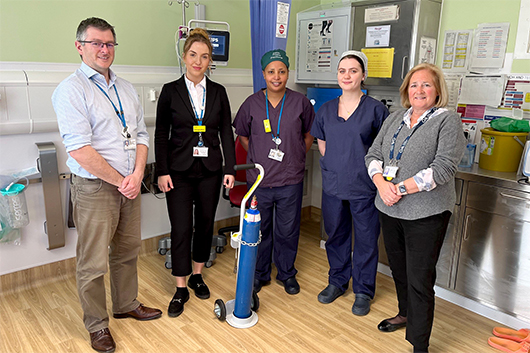Media Release
Date: 27 February 2024
No laughing matter, RUH has dramatically dropped its carbon footprint by switching nitrous oxide delivery
- The RUH has reduced 2% carbon emissions by a simple switch to using portable gas canisters reducing our N2O usage from 2million litres to 13,500 litres a year

A staff led project at the Royal United Hospitals, Bath has made a huge contribution to the Trust's ambitious sustainability targets by decommissioning its entire nitrous oxide manifold which is the system that delivers the gas to the pipelines around the hospital.
Nitrous oxide has been used in hospitals for over 175 years as part of anaesthesia but it is a potent greenhouse gas, estimated to be nearly 300 times worse than carbon dioxide for the environment. A significant proportion of nitrous oxide emissions at older NHS hospitals is due to waste from manifolds and the associated old pipework.
The RUH Nitrous Oxide Working Party, made up of medics, estates staff, porters and sustainability experts, started surveying the N2O use in 2022 and discovered that routine N20 orders far exceeded what was needed.
The group led the Trust in decommissioning three cylinder manifolds and replacing them with portable N2O cylinders to be used in all theatres. They trained 75% staff to use the portable cylinders in three weeks in time for all three manifolds to be decommissioned. This simple switch has cut emissions by 2% (equivalent to SpaceX Falcon 9 flight to the international space station) and will save the trust £7,000 a year.
For mothers in labour Entonox, ("gas and air") is still readily available for those that need it.
Abigail Mann, Clinical Fellow in Anaesthesia at RUH said: "Anaesthetic gases currently make up 2% of the NHS' carbon footprint and N2O is responsible for a 80% of this, so it has been brilliant working alongside so many different colleagues at the RUH whose expertise and energy has helped to make this switch to a more environmentally friendly way of working so seamless."
Brian Johnson, Director of Estates and Facilities at RUH said: "This is a really positive step forward in our efforts to reduce our carbon footprint at the RUH. Changing behaviours is critical to the success of many of our sustainability projects so I wanted thank everyone at the Trust who have demonstrated real enthusiasm and interest in progressing our ambitions to reducing our carbon footprint as rapidly as possible as we work towards net zero carbon by 2045.
ENDS

